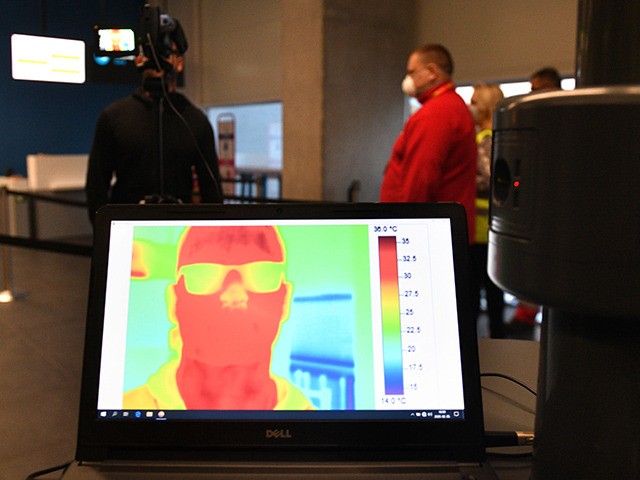Chinese Communist Party officials reportedly transferred a deaf political prisoner into coronavirus quarantine, the Epoch Times revealed on Wednesday, to hide signs of torture and keep him from seeing family.
The newspaper identified the political prisoner as Gong Fengqiang, a longtime member of the Falun Gong spiritual movement who lost his hearing after multiple arrests from which he emerged with visible signs of torture. The Epoch Times itself has for decades maintained ties with Falun Gong and relayed the report from a Falun Gong website, Minghui.
Gong was reportedly arrested in December, before authorities identified the ongoing outbreak of a new coronavirus in Wuhan, for practicing Falun Gong. His wife reportedly died in early December of a fatal fall that occurred as she fled police; she also faced charges of practicing Falun Gong.
Falun Gong is a movement partially based in Taoism and Buddhism that promotes healthy living, exercise, meditation, and self-restraint. The Communist Party considers practitioners members of a terrorist cult despite no evidence of violent activity by Falun Gong followers in the country. For decades, Falun Gong practitioners have faced extreme persecution, arrest, torture, and death, and have reportedly been Beijing’s primary target for the illegal harvesting of organs to sell on the black market.
Gong was reportedly arrested in far-north Heilongjiang, over 1,500 miles from the epicenter of the coronavirus outbreak. At press time, the government of Heilongjiang province has documented 378 cases of coronavirus and eight deaths out of the 44,685 cases and 1,115 deaths identified in China.
Minghui reported that his family has chosen to go public with his story because they fear for his life, noting that he appeared to have endured beatings and torture after his December arrest and before his disappearance into quarantine.
“While in custody, he was ‘abused in a detention center’ by Chinese Communist Party (CCP) officials and lost consciousness. He was then taken to a coronavirus quarantine center because officials had sought to cover up the incident,” the Epoch Times relayed. The publication cited Minghui to detail Gong’s history as a victim of communist political violence:
When he was released from detention several years ago, Gong “had lost his memory and couldn’t recognize anyone at home. He didn’t know how to talk, eat, or take care of himself,” according to the website. “He often fainted. His urine was milky-white. He suffered constant chest pain and had trouble breathing. He also had heavy sweats that often soaked his bedding and clothes.”
In past reports, Minghui has described Gong as “mentally disabled” after experiencing torture in police custody. In 2008, Minghui accused the Communist Party of abducting Gong at the turn of the century in response to him making a public appeal to end the persecution of Falun Gong practitioners:
In 2000, Mr. Gong went to Beijing to appeal for Falun Gong. He was arrested and detained in Yilan County for 34 days. While in detention, the county police tortured him brutally. They beat him, pushed tooth-picks under his fingernails, and rubbed his ribs with sharp-edged, hard objects. Once the police used electric batons to shock him, making him vomit and lose control of his bowels. In the meantime, police officers Han Yunjie (who later died unexpectedly) and Liu Chen ransacked Mr. Gong’s home. It was winter. They even took the family’s pots and pans. Liu Chen threatened Mr. Gong’s wife, saying, “If we can’t make you suffer, we will make your husband suffer.” (Mr. Gong’s wife was pregnant at the time.)
The alleged use of the coronavirus outbreak to persecute political dissidents and enemies of the communist state highlights concerns of totalitarian measures that arose nearly immediately after reports began to circulate of a “mystery pneumonia” killing people in Wuhan. Reports indicate that residents of Wuhan became aware of a sickness spreading in mid-December, but authorities only acted in early January, shutting down a wild meat market on January 1 suspected of being the origin of the virus. Beijing alerted the public to the discovery of an unidentified form of coronavirus on January 20, not warning health officials to isolate potential carriers until then.
Two weeks before that public alert, however, the government of Hong Kong greatly expanded isolation powers, citing the mystery illness as the reason. A new ordinance approved by Chief Executive Carrie Lam gave “legal powers to health authorities to isolate patients suspected of contracting an unidentified virus after visiting Wuhan.” The ordinance inspired fears that the government would falsely accuse Hong Kong pro-democracy protesters of being suspected virus carriers and quarantine them, preventing free assembly. At press time, no accusations of such abuse of that ordinance have surfaced.
In Wuhan itself, however, the Chinese government immediately silenced individuals who attempted to discuss the viral outbreak before January 20. In one particularly prominent case, Wuhan police detained a doctor, 34-year-old Li Wenliang, for posting in a private WeChat group that he believed the illness spreading in the city was contagious. Police forced him to sign a humiliating statement confessing to “severely disturbing public order” by discussing the disease. Li died last week, allegedly after contracting the virus, a rare death as most killed by the virus are seniors or individuals already facing other illnesses.
In response to public outrage about Li’s death and widespread reports of local officials refusing to test potential virus carriers to suppress the official number of cases, Beijing deployed federal communist leaders to Wuhan this week. The Global Times, a state propaganda outlet, quoted a senior Beijing official condemning his Wuhan counterparts.
“Wuhan is now in wartime. These people behaved very badly,” Gao Yu, deputy secretary-general of the State Council and director of the supervision bureau of the General Office of the State Council, reportedly said on Tuesday.
The Global Times described the hospitalization process for potential carriers as “full of problems.”
Follow Frances Martel on Facebook and Twitter.

COMMENTS
Please let us know if you're having issues with commenting.